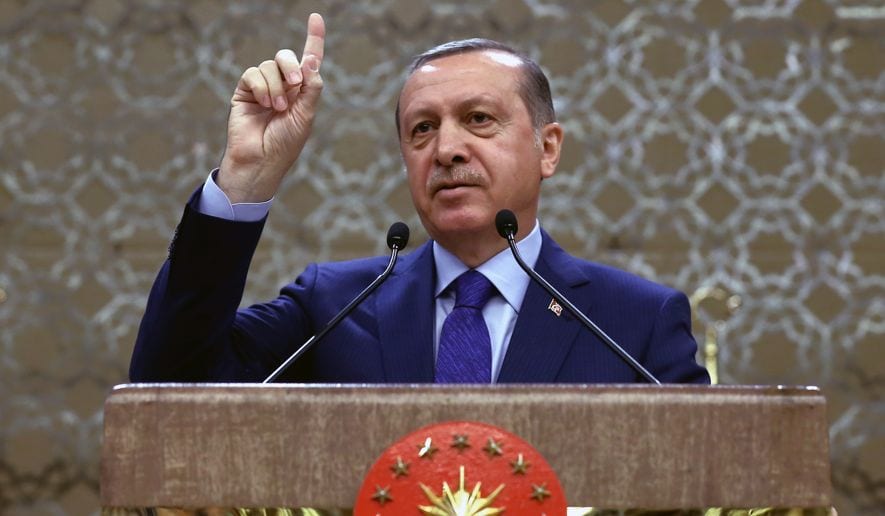Category: News
-
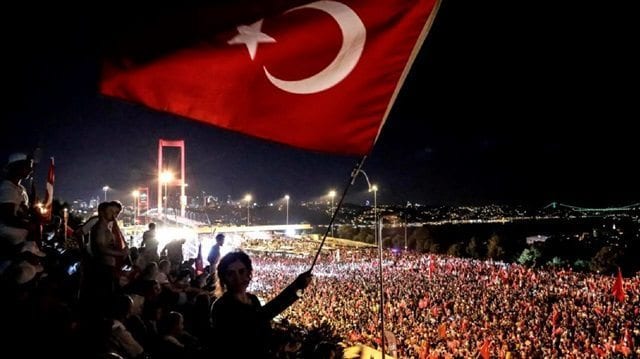
EU source says Turkey coup bid looks substantial, ‘not just a few colonels’
EU source says Turkey coup bid looks substantial, ‘not just a few colonels’
A coup attempt in Turkey involves a substantial part of the military and “not just a few colonels”, a European Union source monitoring events in the EU candidate country said on Friday.
“It looks like a relatively well orchestrated coup by a substantial body of the military, not just a few colonels,” the source told Reuters.
“They’ve got control of the airports and are expecting control over the TV station imminently,” the source said, shortly before state television TRT broadcast a military declaration of martial law.
“They control several strategic points in Istanbul. Given the scale of the operation, it is difficult to imagine they will stop short of prevailing,” the source said.
Another European diplomat said he was attending a dinner with the Turkish ambassador in a European capital when they were interrupted by messages on their mobile phones.
“This is clearly not some tinpot little coup. The Turkish ambassador was clearly shocked and is taking it very seriously,” the diplomat told Reuters as the dinner party broke up.
(Reporting by Paul Taylor and Alastair Macdonald; Writing by Paul Taylor)
-
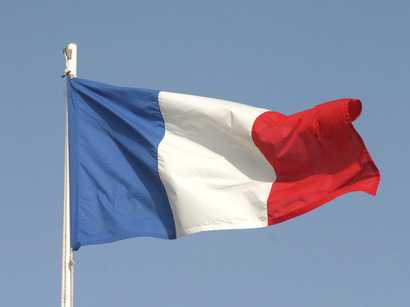
French Mayor Says ‘No More Muslims’,
Orders The Destruction Of The Infamous Calais Camps And Expulsion Of Over Seven Thousand Muslims
It is about time.
We have reported here extensive on Shoebat.com about the “Calais jungle”- the once popular French tourist town turned into a third-world Muslim hell on earth where violence is rampant, rapes are random, and non-Muslims are hated with a passion. Calais is not just a “black spot” on Europe, but many Europeans look at is as the face of Europe’s future if Islam takes over.
It has taken a long time, but the French are finally pushing back against the Muslims in Calais. So much is the pushback that the mayor of Calais has promised to destroy a large part of the camp and displace thousands of Muslims in the process:
Thousands of refugees living in the so-called Calais ‘Jungle’ will soon lose their makeshift homes as the northern half of the camp is set to be demolished.
Calais mayor Natacha Bouchart told journalists on Monday that the remaining half of the camp would soon be dismantled, though no date has yet been given.
“We can’t wait any longer, we need to know as soon as possible when and how the Jungle will be torn down,” she said.
“It is absolutely urgent for this town, its people and its businesses.”
According to Reuters, the Calais prefecture, which would issue the order to demolish the camp, declined to comment on the matter yesterday
I say good for Calais and the French. It is about time they started standing up for themselves. As we have shown, these Muslims want nothing to do with European society except to rob it of all the good it has, destroy the west, and then blame the people who invited them in for the problems which they created.
Islam has no place in Europe. It never did, and it is about time Europe started sending these people back to the lands where they came from.
*Article by Andrew Bieszad
-

The Guardian: “Now the truth emerges: how the US fuelled the rise of Isis in Syria and Iraq

www.theguardian.com Seumas Milne
Islamic State Opinion .. The sectarian terror group won’t be defeated by the western states that incubated it in the first place
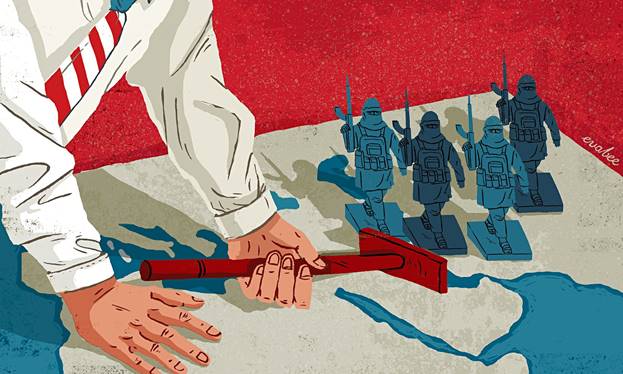
lustration by Eva Bee
Shares 449,185
The war on terror, that campaign without end launched 14 years ago by George Bush, is tying itself up in ever more grotesque contortions. On Monday the trial in London of a Swedish man, Bherlin Gildo, accused of terrorism in Syria, collapsed after it became clear British intelligence had been arming the same rebel groups the defendant was charged with supporting.
The prosecution abandoned the case, apparently to avoid embarrassing the intelligence services. The defence argued that going ahead with the trial would have been an “affront to justice” when there was plenty of evidence the British state was itself providing “extensive support” to the armed Syrian opposition.
That didn’t only include the “non-lethal assistance” boasted of by the government (including body armour and military vehicles), but training, logistical support and the secret supply of “arms on a massive scale”. Reports were cited that MI6 had cooperated with the CIA on a “rat line” of arms transfers from Libyan stockpiles to the Syrian rebels in 2012 after the fall of the Gaddafi regime.
Clearly, the absurdity of sending someone to prison for doing what ministers and their security officials were up to themselves became too much. But it’s only the latest of a string of such cases. Less fortunate was a London cab driver Anis Sardar, who was given a life sentence a fortnight earlier for taking part in 2007 in resistance to the occupation of Iraq by US and British forces. Armed opposition to illegal invasion and occupation clearly doesn’t constitute terrorism or murder on most definitions, including the Geneva convention.
But terrorism is now squarely in the eye of the beholder. And nowhere is that more so than in the Middle East, where today’s terrorists are tomorrow’s fighters against tyranny – and allies are enemies – often at the bewildering whim of a western policymaker’s conference call.
, US, British and other western forces have been back in Iraq, supposedly in the cause of destroying the hyper-sectarian terror group Islamic State (formerly known as al-Qaida in Iraq). This was after Isis overran huge chunks of Iraqi and Syrian territory and proclaimed a self-styled Islamic caliphate.
The campaign isn’t going well. Last month, Isis rolled into the Iraqi city of Ramadi, while on the other side of the now nonexistent border its forces conquered the Syrian town of Palmyra. Al-Qaida’s official franchise, the Nusra Front, has also been making gains in Syria.
Some Iraqis complain that the US sat on its hands while all this was going on. The Americans insist they are trying to avoid civilian casualties, and claim significant successes. Privately, officials say they don’t want to be seen hammering Sunni strongholds in a sectarian war and risk upsetting their Sunni allies in the Gulf.
A revealing light on how we got here has now been shone by a recently declassified secret US intelligence report, written in August 2012, which uncannily predicts – and effectively welcomes – the prospect of a “Salafist principality” in eastern Syria and an al-Qaida-controlled Islamic state in Syria and Iraq. In stark contrast to western claims at the time, the Defense Intelligence Agency document identifies al-Qaida in Iraq (which became Isis) and fellow Salafists as the “major forces driving the insurgency in Syria” – and states that “western countries, the Gulf states and Turkey” were supporting the opposition’s efforts to take control of eastern Syria.
Raising the “possibility of establishing a declared or undeclared Salafist principality”, the Pentagon report goes on, “this is exactly what the supporting powers to the opposition want, in order to isolate the Syrian regime, which is considered the strategic depth of the Shia expansion (Iraq and Iran)”.
American forces bomb one set of rebels while backing another in Syria
Which is pretty well exactly what happened two years later. The report isn’t a policy document. It’s heavily redacted and there are ambiguities in the language. But the implications are clear enough. A year into the Syrian rebellion, the US and its allies weren’t only supporting and arming an opposition they knew to be dominated by extreme sectarian groups; they were prepared to countenance the creation of some sort of “Islamic state” – despite the “grave danger” to Iraq’s unity – as a Sunni buffer to weaken Syria.
That doesn’t mean the US created Isis, of course, though some of its Gulf allies certainly played a role in it – as the US vice-president, Joe Biden, acknowledged last year. But there was no al-Qaida in Iraq until the US and Britain invaded. And the US has certainly exploited the existence of Isis against other forces in the region as part of a wider drive to maintain western control.
The calculus changed when Isis started beheading westerners and posting atrocities online, and the Gulf states are now backing other groups in the Syrian war, such as the Nusra Front. But this US and western habit of playing with jihadi groups, which then come back to bite them, goes back at least to the 1980s war against the Soviet Union in Afghanistan, which fostered the original al-Qaida under CIA tutelage.
It was recalibrated during the occupation of Iraq, when US forces led by General Petraeus sponsored an El Salvador-style dirty war of sectarian death squads to weaken the Iraqi resistance. And it was reprised in 2011 in the Nato-orchestrated war in Libya, where Isis last week took control of Gaddafi’s home town of Sirte.
In reality, US and western policy in the conflagration that is now the Middle East is in the classic mould of imperial divide-and-rule. American forces bomb one set of rebels while backing another in Syria, and mount what are effectively joint military operations with Iran against Isis in Iraq while supporting Saudi Arabia’s military campaign against Iranian-backed Houthi forces in Yemen. However confused US policy may often be, a weak, partitioned Iraq and Syria fit such an approach perfectly.
What’s clear is that Isis and its monstrosities won’t be defeated by the same powers that brought it to Iraq and Syria in the first place, or whose open and covert war-making has fostered it in the years since. Endless western military interventions in the Middle East have brought only destruction and division. It’s the people of the region who can cure this disease – not those who incubated the virus.
-
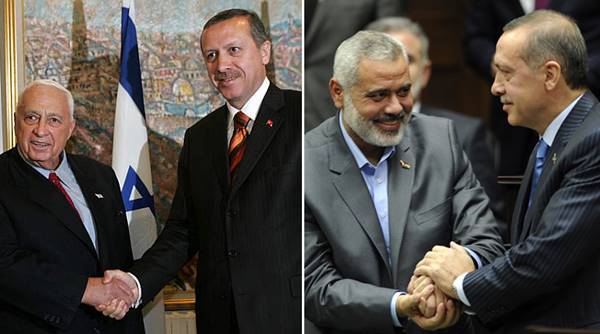
Turkey and Israel: Happy Together?
by Burak Bekdil
Ironically, the futile Turkish effort to end the naval blockade of Gaza is ending in quite a different direction: Now that Turkey has agreed to send humanitarian aid through the Ashdod port, it accepts the legitimacy of the blockade.
Ostensibly, almost everyone is happy. After six years and countless rounds of secret and public negotiations Turkey and Israel have finally reached a landmark deal to normalize their downgraded diplomatic relations and ended their cold war. The détente is a regional necessity based on convergent interests: Divergent interests can wait until the next crisis.
UN chief Ban Ki-moon welcomed the deal, calling it a “hopeful signal for the stability of the region.”
Secretary of State John Kerry, too, welcomed the agreement. “We are obviously pleased in the administration. This is a step we wanted to see happen,” he said.
And Israeli Prime Minister Benjamin Netanyahu thinks that the agreement to normalize relations will have a positive impact on Israel’s economy. “It has also immense implications for the Israeli economy, and I use that word advisedly,” Netanyahu said, in likely reference to potential deals with Turkey for the exploration and transportation of natural gas off the Israeli coast.
A few years ago, according to the official Turkish narrative, “Israel is a terrorist state and its acts are terrorist acts.” Today, in the words of Turkey’s Minister of the Economy, Nihat Zeybekci, “For us Israel is an important ally.”
Turkey has long claimed that it would not reconcile with Israel unless its three demands have been firmly met by the Jewish state: An official apology for the killings of nine Islamists aboard the Turkish flotilla led by the Mavi Marmara which in 2010 tried to break the naval blockade of Gaza; compensation for the victims’ families; and a complete removal of the blockade. In 2013, Netanyahu, under pressure from President Barack Obama, apologized for the operational mistakes during the raid on the Mavi Marmara. The two sides have also agreed on compensation worth $20 million. With the deal reached now and awaiting Israeli governmental and Turkish parliamentary approvals, the narrative on the third Turkish condition looks tricky.
Announcing the deal, Turkish Prime Minister Binali Yildirim said that a first ship carrying over 10,000 tons of humanitarian aid from Turkey to Gaza, part of the deal between Turkey and Israel, will set out for Ashdod Port on July 1. A 200-bed Turkey-Palestine “friendship hospital” will also be put into service as soon as possible. Turkey’s housing agency will engage in a development project in Gaza, too. And that is fine.
But then Yildirim claimed that the embargo on Gaza will largely be lifted under the leadership of Turkey. That is completely wrong and simply an effort to cheat, aiming at Turkey’s domestic consumption. A maverick way to tell Turkey’s massive Islamist voting base: “Sorry, we have failed to remove the blockade of Gaza but are trying to sell it as if we did.” Even before the deal, Turkey, like other countries, was free to send humanitarian aid to Gaza through Israel’s designated port of Ashdod. Now it will send aid through the same port, not directly into the Gazan shores. Hence, Netanyahu’s caution that “the Israeli naval blockade of Gaza would continue after the deal.”
After six tiring years of concerted efforts to isolate Israel internationally unless Jerusalem removed the naval blockade of Gaza, Turkey had to go back to where it first took off and, in embarrassment, trying to sell the deal as a major diplomatic victory. One pro-government columnist flagrantly wrote: “Ankara opened a humanitarian corridor to Gaza and accomplished the freedom flotilla’s historic mission.”

The ups and downs of Turkey’s relations with Israel — what comes next?
Left: Turkish President Recep Tayyip Erdogan (then Prime Minister) shakes hands with then Israeli Prime Minister Ariel Sharon, on May 1, 2005. Right: Erdogan shakes hands with Hamas leader Ismail Haniyeh on January 3, 2012.All the same, the government’s propaganda machine now spreading the message that the great power Turkey got Israel on its knees is not always working well.
“It looks like the government has given up on its principles and values. It will lose support as a result,” said Ismail Bilgen, whose father was one of those killed on the Mavi Marmara. “The Justice and Development Party [AKP] enjoys great support due to its resolute principled stance on issues but this move is in total contradiction to that.”
He added:
“Restoring ties in this manner is unacceptable. The Israelis are acting like the compensation is an act of benevolence on their part rather than a punishment for their crimes … My father and his friends died trying to bring international attention to the inhumane blockade imposed on Gaza and to have it lifted. It now appears like their martyrdom will have been in vain.”
Cigdem Topcuoglu, whose husband was killed aboard the Mavi Marmara, said:
“Our struggle will continue no matter what. I am against it [the normalization deal] completely … In no way should an agreement be reached or friendship established with the Zionists calling themselves Israel, and who have blood on their hands … Our president [Recep Tayyip Erdogan] when he met with us told us the blood of the Mavi Marmara martyrs was sacred. I hope our president doesn’t concede to Israel in any way and doesn’t make a deal.”
Too late, too wrong. The deal will go through, and under the approving looks of Erdogan. Ironically, the futile Turkish effort to end the naval blockade of Gaza is ending in quite a different direction: Now that Turkey has agreed to send humanitarian aid through the Ashdod port, it accepts the legitimacy of the blockade.
Burak Bekdil, based in Ankara, is a Turkish columnist for the Hürriyet Daily and a Fellow at the Middle East Forum.
-
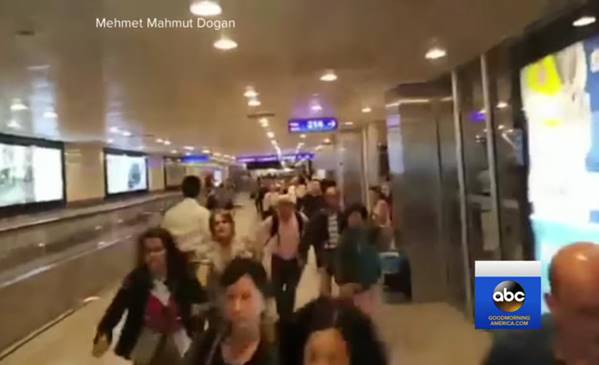
Turkey: Victim of Its Own Enthusiasm for Jihad
by Burak Bekdil
July 7, 2016 at 4:00 am- “Infidels who were enemies of Islam thought they buried Islam in the depths of history when they abolished the caliphate on March 3, 1924 … We are shouting out that we will re-establish the caliphate, here, right next to the parliament.” — Mahmut Kar, media bureau chief of Hizb ut-Tahrir Turkey.
- “The magazine [Dabiq] creates propaganda for [ISIS]. It has an open address. Why does no one raid its offices?” — Opposition MP Turkey’s Parliament.
The government big guns in Ankara just shrugged it off when on June 5, 2015, only two days before general elections in the country, homegrown jihadist militants for the Islamic State of Iraq and Syia (ISIS, or ISIL or IS) detonated bombs, killing four people and injuring over 100, at a pro-Kurdish political rally.
Again, when IS, on July 20, 2015, bombed a meeting of pro-Kurdish peace activists in a small town on Turkey’s Syrian border, killing 33 people and injuring over 100, the government behaved as if it had never happened. After all, a bunch of “wild boys” from the ranks of jihad — which the ruling party in Ankara not-so-secretly aspires to — were killing the common enemy: Kurds.
Then when IS jihadists, in October, killed over 100 people in the heart of Ankara, while targeting, once again, a public rally of pro-peace activists (including many Kurds), the Turkish government put the blame on “a cocktail of terror groups” — meaning the attack may have been a product of Islamists, far-leftist and Kurdish militants. “IS, Kurdish or far-leftist militants could have carried out the bombing,” the prime minister at the time, Ahmet Davutoglu, said. It was the worst single terror attack in Turkey’s history, and the Ankara government was too demure even to name the perpetrators. An indictment against 36 suspects, completed nearly nine months after the attack, identified all defendants as Islamic State members. So there was no “cocktail of terror.” It was just the jihadists.
In the last year, there had been further jihadist acts of terror, targeting Turks and foreign tourists, but with relatively few casualties up to now. At an Istanbul airport, however, a mysterious explosion, which the authorities hastily attempted to cover up, was probably the precursor of the latest mega-attack in Istanbul. The management at Istanbul’s Sabiha Gokcen Airport said on Dec. 23, 2015 that: “There was an explosion at the apron and investigation regarding its cause is progressing … Fights have resumed.” That unidentified explosion consisted of three or four mortars fired at a passenger plane parked at the apron. The attack killed one unfortunate cleaner.
The incident was quickly “disappeared” from the public memory. One person dying in a mysterious explosion was too minor for a collective Turkish memory that had grown used to casualties coming in the dozens. It was, in fact, a powerful message from the terrorists: We will target your lifeline — air traffic.
Every year about 60 million travelers pass through Istanbul’s main airport, Ataturk. Turkey is now building an even bigger airport that will host 150 million passengers a year. Completing the mission from December’s “minor and unresolved” attack at the Sabiha Gokcen Airport, the terrorists visited Ataturk Airport on June 28, killing at least 45 and injuring hundreds of people.

Travelers are shown fleeing, trying to escape the terrorists attacking Istanbul’s Ataturk Airport, June 28, 2016. (Image source: ABC video screenshot)
Turkish prime minister, Binali Yildirim, said that it was “probably” an attack by IS. Days later, the suicide bombers were identified as jihadists of Central Asian origin.
In a state of perpetual denial, Turkey’s Islamist rulers are still too bashful to admit any linkage between political Islam and violence. Ironically, their denial exposes their country to the risk of even more Islamic terror. Worse, the political Islam they fuel in their own country is growing millions of potential jihadists at home. In November, a Pew Research Center study found that 27% of Turks (more than 20 million) did not have an unfavorable opinion of IS — compared to, say, 16% in the Palestinian territories.
In March, only three months before the latest jihadist attack in Istanbul, thousands of supporters of Hizb ut-Tahrir — a global Islamist group, viewed by Russia and Kazakhstan as a terrorist group but that defines itself as a political organization aiming to “lead the ummah” [Islamic community] to the re-establishment of the caliphate and rule with sharia law — gathered at a public sports hall in Ankara, courtesy of the Turkish government, to discuss the re-establishment of the Islamic caliphate. In his speech, Mahmut Kar, the media bureau chief of Hizb-ut Tahrir Turkey said:
“Infidels who were enemies of Islam thought they buried Islam in the depths of history when they abolished the caliphate on March 3, 1924 … We are hopeful, enthusiastic and happy. Some 92 years later… we are shouting out that we will re-establish the caliphate, here, right next to the parliament.”
It was not a coincidence that an opposition MP on July 1 took the speaker’s point at the Turkish parliament, showed a copy of a magazine, Dabiq, largely viewed as IS’s press organ, to an audience and said: “This is [IS’s] official magazine. It is published in Turkey. Its fifth issue is out now. The magazine creates propaganda for [IS]. It has an open address. Why does no one raid its offices?”
That question will probably remain unanswered.
Burak Bekdil, based in Ankara, is a Turkish columnist for the Hürriyet Daily and a Fellow at the Middle East Forum.

